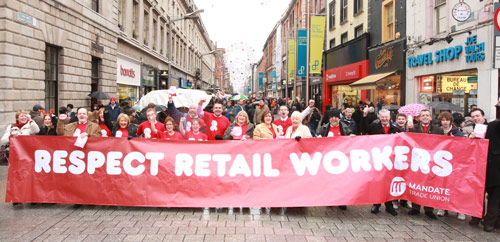The Mandate trade union has called on the Government to use budgetary surplus to improve public services and housing while replacing the minimum wage with a living wage.
Mandate, representing more than 24,000 workers in the retail, bar and administration sectors, is calling on the Government to invest in capital spending, improving public services, and introducing a living wage. The union, which represents mostly low-paid workers, said that its members cannot afford private health services or the purchase of their own home and insists that the Government step in to address these crucial issues.
In a pre-budget statement Mandate has called for
- the removal of sub-minimum rates of the national minimum wage
- the introduction of a living wage (at present considered to be €13.85 per hour) to replace the national minimum wage
- the declaration of a housing emergency and the implementation of the principal Raise the Roof policies
- new legislation to allow workers access to more hours
- strong collective bargaining legislation to enable workers to increase their wages.
The assistant general secretary of Mandate, Jonathan Hogan, said: “We are calling on the Government to meaningfully address the cost of living crisis by utilising a once-in-a-generation opportunity to invest the extraordinary budgetary surplus in public housing.”
Statistics from the Department of Finance show it will reap a budget surplus of €10 billion (£8.6 billion) this year, or 3½ per cent of national income. It is Mandate’s belief that this surplus should not be squandered through tax cuts but should instead be invested in improving public services for all.
“We are also calling on the Government to empower workers to improve their own lot by strengthening trade union legislation, including collective bargaining, while also legislating to allow workers to increase their hours at work as hours become available.”
He explained that Mandate’s position on the 2024 budget has been taken after extensive consultation with low-paid workers over the past two years. “We have conducted dozens of surveys of our members and also adopted positions based on our biennial delegate conference (BDC), which sets Mandate policies for the two years ahead. At our last conference, in 2022, members from all across the country prioritised housing, investment in mental health services, investment in autism services, enhanced workers’ rights, and the introduction of an employer-funded pension scheme.
“Importantly, the only commentary on taxation at our conference was to close loopholes and ensure the largest corporations and highest-income households paid their fair share so that we can all have a decent standard of living. Nobody sought tax cuts.”
Mandate insists that this budget will have an impact on next year’s local and EU elections, and that politicians shouldn’t believe that workers can be bought with tax cuts. “We’ve gone through almost ten years of tax cuts since the austerity years, and virtually nobody has benefited from them other than the highest-earners. Workers need investment in the essentials—housing, health care, education, energy—and if they don’t see that happening we can expect the Government parties to suffer in next year’s elections.”





